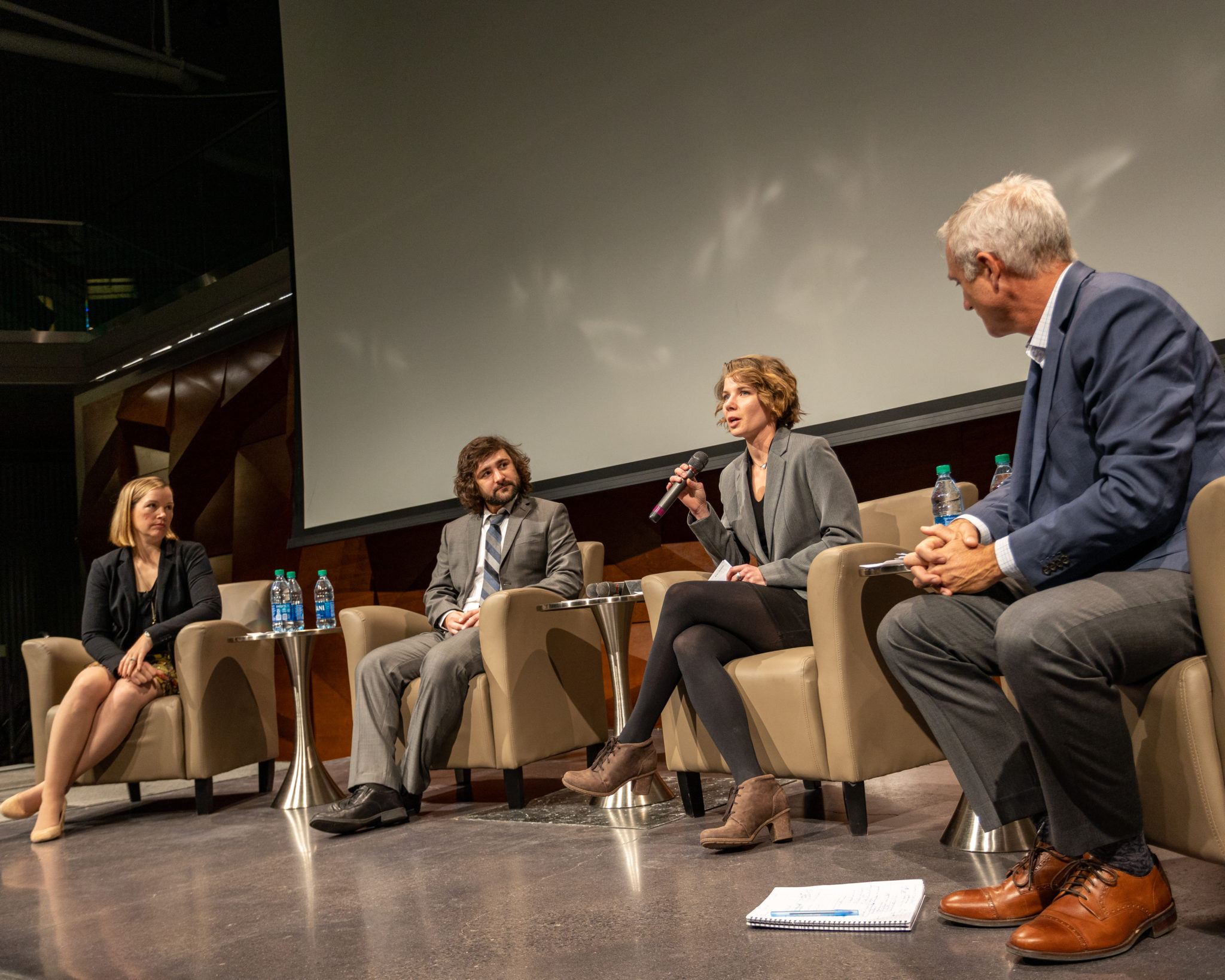
“I once had a meeting with a senator’s staff member while he walked down a hall to another meeting,” wrote Amanda Koch, a Ph.D. student in the Colorado State University Department of Biochemistry and Molecular Biology and fellow for the Colorado Science and Engineering Fellowship, in her article “How I use Science to Influence Policy.” Koch’s article won second place in the international science writing competition run by Bio-Rad Antibodies.
“The staffer came out of his office, looked at me, asked my name and then said, ‘follow me’ as he turned into the hall,” she wrote. “Frazzled, I gathered all my things; I was carrying too much and not wearing the right shoes for hurrying to catch up with someone … I was there to tell the staffer why the senator should support funding for scientific research. I had to do it in three minutes.’”
Koch has been at the forefront of policy since the 2016 elections. Despite the pressure of perfecting a three-minute pitch and the accompanying nervousness and sweaty palms, she recognized a need within the political world and she attempted to fill it.
“Amanda shapes science by reminding her peers that as a graduate student, one has a powerful and intelligent voice to shine light on disparities, engage with others, and demonstrate how science should guide us in solving our world’s greatest societal challenges,” said Mary Stromberger, dean of the CSU Graduate School. “Through her leadership and example, she empowers others to take action.”
Koch took over the Natural Sciences Instagram in August to share her efforts to shape policy. Watch here:
Science meets policy
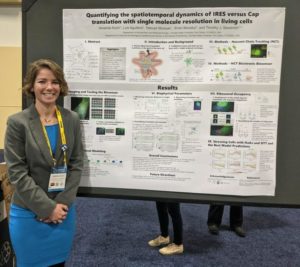 “I realized that scientists, for the most part, just have these conversations and don’t go out and do anything more than just vote,” she said. “I was in that camp too.”
“I realized that scientists, for the most part, just have these conversations and don’t go out and do anything more than just vote,” she said. “I was in that camp too.”
Before 2016, “I had never been super politically active,” she said. “I had voted in Tennessee, but it was really nothing more than that. I didn’t know who my representatives or my senators were.”
At the time, she was at CSU working on her thesis defense, studying for qualifying exams, teaching a class and running experiments in the lab. She and her friends started having political conversations, discussing the overlap of science and policy and how interconnected the two are in broader society.
“I was really passionate, but I didn’t know how to direct that passion,” she said. “Finding a group of people, for me, was the easiest first step. Brainstorming with other people and really figuring out what is feasible for us to actually do was a huge help.”
Koch, along with a few friends, started to organize. They started a group at CSU, Science in Action, with the goal to bridge the gap between policy and science.
The focus was on getting scientists out of the lab, putting themselves out there to the public and to policymakers to advocate for evidence-based decision making in the political sphere and continued, if not accelerated funding for scientific research.
Another big focus of the group was communication: “How are you going to communicate your asks once you get into the office of a policymaker?”
With funding from the Union of Concerned Scientists and CSU’s Vice President for Research’s office, and a partnership with the National Science Policy Network they were able to connect passionate CSU students to broader, more powerful agencies.
The group hosted letter-writing campaigns and would call their senators and representatives, asking for continued funding of NIH and NSF. They held communication workshops and did outreach in the community. They focused on big issues like the opioid crisis and climate change.
With the emergence of the COVID-19 pandemic, it has become all the more relevant to make evidence-based, science-backed decisions, so that has been on the forefront of the group’s work in recent months.
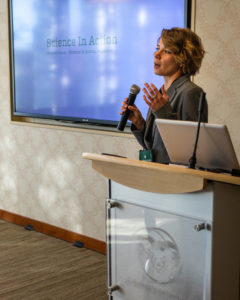 “Through Science in Action, Amanda empowers graduate students to have a stronger voice in representing science and research to policymakers and the public,” said Stromberger. “These examples demonstrate that Amanda is a person who takes positive action to solve problems and challenges – she is just as focused on identifying solutions as she is on studying problems.”
“Through Science in Action, Amanda empowers graduate students to have a stronger voice in representing science and research to policymakers and the public,” said Stromberger. “These examples demonstrate that Amanda is a person who takes positive action to solve problems and challenges – she is just as focused on identifying solutions as she is on studying problems.”
Why it matters
Koch believes that science is inextricably linked to broad, societal wellbeing. Almost everything we interact with, our cellphones, our cars, our medicines, are products of scientific research.
“Ultimately you, me, your mom, your dad, we’re all paying taxes, which fund the budget for our research,” said Koch. “So, you all, everyone, is a stakeholder in the work we are doing. So, it would be almost unfair to keep our work private from the people who are funding it.”
Aside from alerting the public of important research happening in labs across the country, it is also essential that this research is actually utilized in making policy decisions regarding public health and wellbeing.
“If you look at the makeup of the different science committees in the federal government, in the state government, how many senators and representatives are scientists? It’s maybe one or two. These people are making huge decisions about how science is conducted, and how science influences their decisions on critical things that are happening in the world.”
To make matters more urgent, Koch also explained what she called an era of misinformation.
“We, right now as a society, are facing some pretty big obstacles regarding climate change and this pandemic, that need scientists to talk about the best practices to mitigate these things to ultimately help society. We need to utilize the residual trust in science to combat this era of misinformation that we are in right now.”
Valuing every voice at the table
“I greatly admire Amanda for her ability to see, and willingness to act on, the broader issues facing graduate students and society today,” said Stromberger. “She demonstrates to others that the actions of one or a few can make a tremendous and positive impact to others. She has been incredibly generous of her time and service to students across campus.”
Koch believes that there is a place at the table for everyone seeking to get involved in policy. Every person has new energy and new ideas to bring to the conversation, and Koch’s work is just the start of what could be a huge movement.
“Science is about collaboration and about figuring out these problems,” she said. “Based on where I come from and how I grew up, I have a certain perspective and way of solving problems. But having other people, with other perspectives, coming in to help solve these problems is absolutely critical. That’s why these issues of race and immigration policies are so relevant to science. We rely on international students and marginalized groups to come to the table and bring new perspectives to help solve big problems that are going to affect us all.”
Getting involved
“Amanda has a knack for effectively leading by balancing her passion and involvement with projects but also balancing letting those around her contribute, and take ownership for their own projects and ideas,” said Clara Tibbetts, a Ph.D. student in the Department of Chemistry and now president of Science in Action.
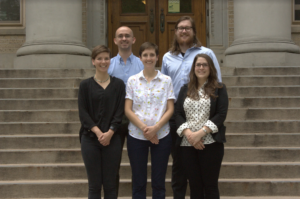 As a seasoned activist, Koch’s first piece of advice for new students looking to get involved is to “find a group, if there is one!”
As a seasoned activist, Koch’s first piece of advice for new students looking to get involved is to “find a group, if there is one!”
“The next thing is to keep up with what’s going on as best as you can. Ask yourself, ‘how would I use the knowledge I have as a scientist to go and have a logical conversation either for or against what’s happening.’”
“Having conversations with your family about this stuff is a lot harder than I thought it was. You want to be prepared, if they get heated and emotional how are you going to take a step back and maybe find common ground- a group can help you prepare to do that.”
The next piece of advice is to keep following your passions.
“Don’t give up,” she said. “It’s hard, but don’t give up. And really, it’s all about practice. Talking to policymakers and your family is scary. Just going in there the first couple of times you are going to be nervous, it’s just going to happen. But realizing that there are very few scientists in these spaces that are doing this work helps me remember that this is valuable. It is super important that we are out there doing this … if we’re not going to do it, then no one else is going to do it.”
If not you, then who?
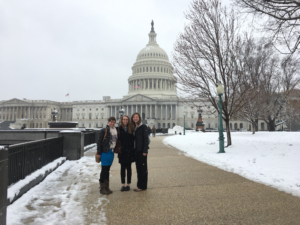 Koch is so passionate that her advocacy work has influenced everyone around her.
Koch is so passionate that her advocacy work has influenced everyone around her.
“She even inspired me on a couple occasions to meet with local politicians, including our state senator John Kefalas!” said Tim Stasevich, Koch’s doctoral research advisor. “Having Amanda in the lab has definitely given me a better understanding of how science policy is created and how we, as scientists, can help shape and influence that policy. Thus, the teacher has become the student.”
Despite her impressive track record at CSU and undeniable work ethic, Koch doesn’t deny that political activism is tough and scary. But that doesn’t mean one should shy from it.
“There have been many times where I’m sitting in the parking lot, all dressed up with my suit on, I’ve got my papers ready to go, I’m about to go into a big meeting, and I’m like: ‘What if I forget to say this?’ I’m sweaty and I’m nervous, and I think: ‘Well, no one else is here having these conversations, so if I’m not here, no one will be. If not you, then who?’”
About Rams Shape Science: Meet some of the extraordinary students, faculty, and staff in the College of Natural Sciences who are shaping the future of science and our society.